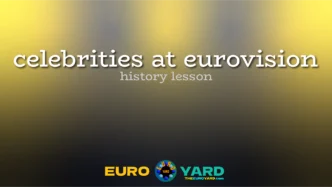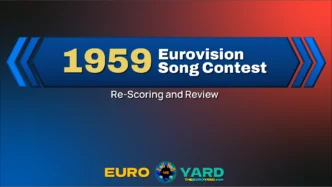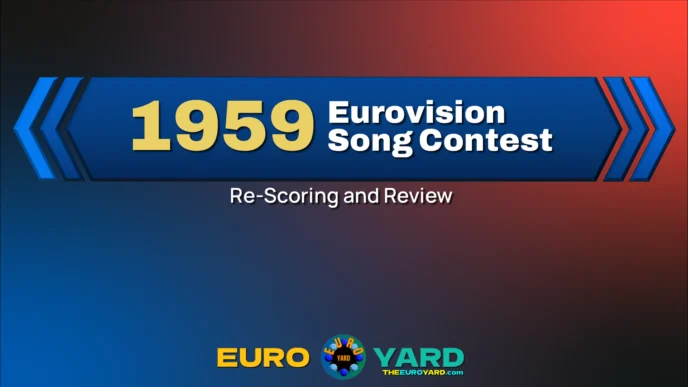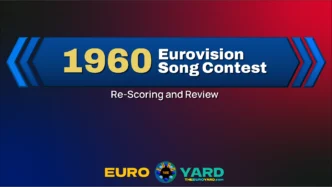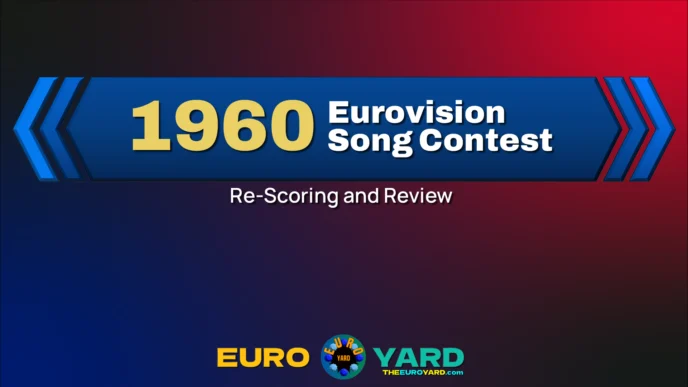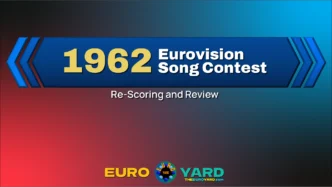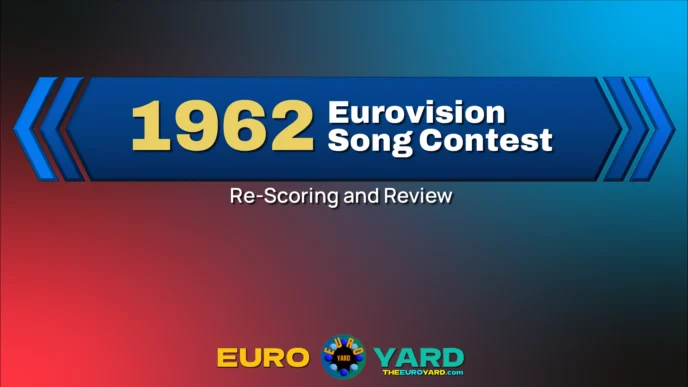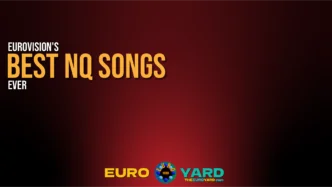Here are our scores for the Eurovision Song Contest 1958.
This was the third Eurovision Song Contest, held in Hilversum, The Netherlands. It was the first time that the previous year’s winner hosted the contest. Switzerland could have hosted it in 1957 after winning in 1956, but that would have meant twice in a row. The venue was the national broadcaster’s (AVRO) television studio outside of Amsterdam.
PLEASE NOTE: As of March 2025, the rankings below are obsolete. To view the updated rankings for 1958, please visit this article.
General Overview of Eurovision Song Contest 1958
Ten countries participated in the contest, just like in 1957. However, they were not the same ten: Sweden made its debut while the United Kingdom sat out this year.
This contest was the first time in which we disagreed with the winner the juries picked. In fact, through 2024, it is still one of the sharpest disagreements we have ever had.
Though this song gave us an iconic Eurovision performance or two, it was the weakest contest to this point in its brief history. The vast majority of the ten songs were average at best. Not to give too much away, but in the next few years coming up, we noted a further decline in the quality of the product. This will turn around in a big way, but it’s going to take a few contests.
It would also present the final opportunities to see some Eurovision legends. Lys Assia, the contest’s first winner from Switzerland, and Corry Brokken, the second winner from The Netherlands, would each represent their countries for the final time. Assia had sung all four Swiss Eurovision songs through this contest, while Brokken had done three. The former would return to the contest decades later as a special guest, while Brokken came back from a legal career to host the 1976 edition.
Scoring the Contest
As always, we use the 12, 10, 8-1 system to rank our top ten and add the points to the all-time scoreboard. Like in 1957, there were only ten participating countries, so all contenders received at least one point.
10th Place
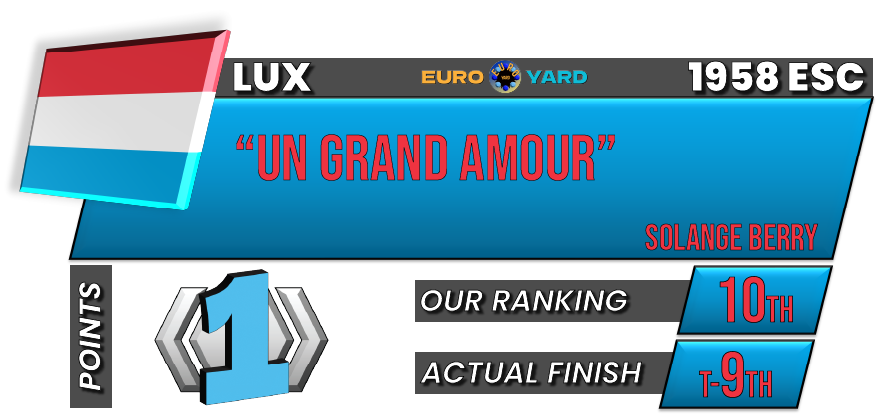
Bringing up the rear in 1958 was Luxembourg’s Un grand amour, performed by Solange Berry.
It is unfortunate that this was the weakest effort of the contest, but I found the number to be a little dull. She sounded okay, but this was not an interesting tune. In fact, I have heard it several times (including right before publishing this piece) and could not tell you how it goes.
9th Place
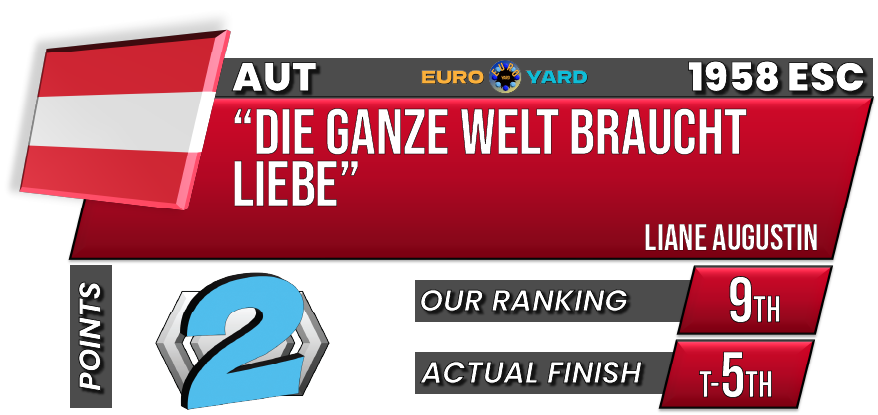
In ninth position, gaining two points for Austria, was the song Die ganze Welt braucht Liebe by Liane Augustin.
It was just okay. I put it in a similar category to the Luxembourgish song before it: The singing was fine, and it was a little unmemorable. It was higher because I thought she did a little more in the vocal category, but I would not consider this very original.
8th Place
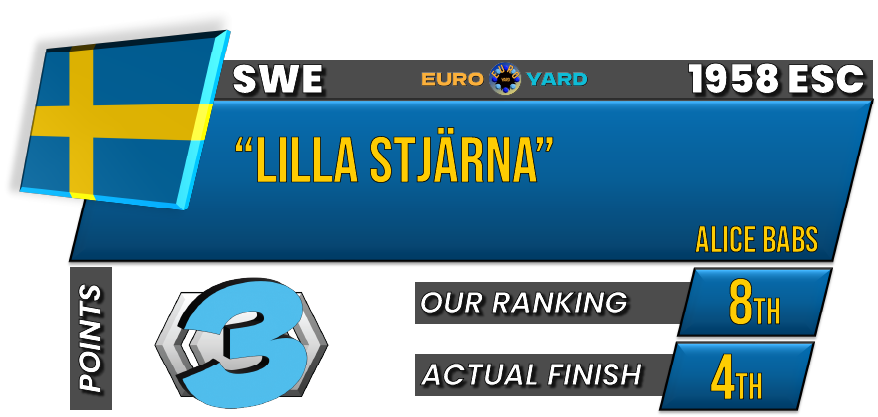
With three points and in eighth place, here is Sweden’s first entry Lilla stjärna by Alice Babs.
In previous scoring of this song, it was much higher than eighth. However, a deeper dive into the song itself and I found a flaw or two. For one thing, despite her having a pretty and pleasant singing voice, the lyrics were weak. The first minute of the song was an instrumental and then her singing the word “la,” which is not in itself a problem because Spain will do well with it in a decade (not to mention Armenia in 2024), but the rest of what surrounded it was not that engaging. This had potential, but on re-review, I found it a little basic.
Don’t worry, Sweden: It gets a lot better.
7th Place
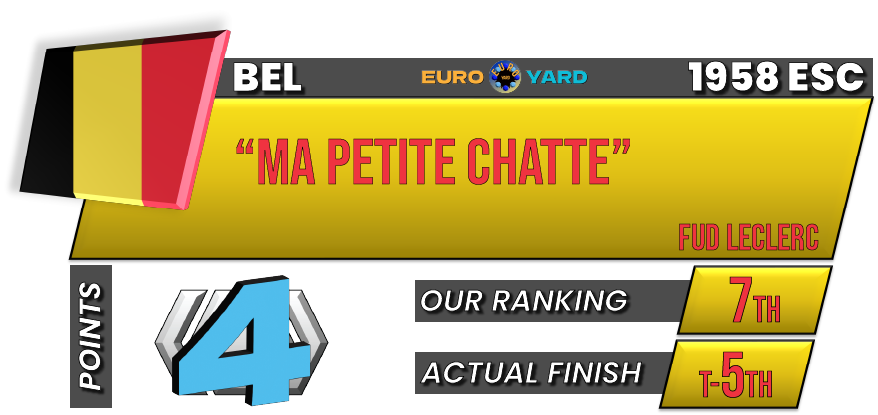
In seventh place is Fud Leclerc, making his second appearance for Belgium with Ma petite chatte. This was probably his best entry, as there will be others.
There are just some artists with whom we do not click, and Fud Leclerc is one for me. This is not to say he was bad, but his music was not my thing, so to speak. With that said, this song had a little bit of energy and tempo at times, and I think he did a respectable job with it. I would have liked more of it.
6th Place
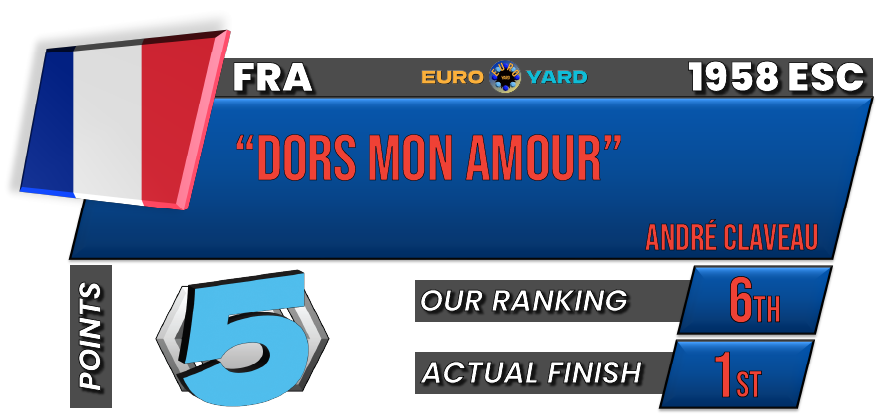
In sixth place on our list was France’s Dors mon amour, performed by André Claveau. For reasons which are as yet unclear to us, this song won the Eurovision Song Contest 1958.
In an attempt to be fair, I will say this song is not bad. The lyrics are decent and Claveau was an effective singer. Winning, however, is a huge reach and after having watched and scored this performance four times using four different methods, I have never gotten anywhere close to putting this song at the top.
This song was painfully average, but won in spite of its mediocrity. The only thing it is remembered for today is being the song that beat “Volare.” My sincerest apologies if I have insulted any French Eurofans, but this was a weak winner in a somewhat weak year. France will have better winners, I promise, because I have seen all our scoresheets and know this for a fact.
5th Place
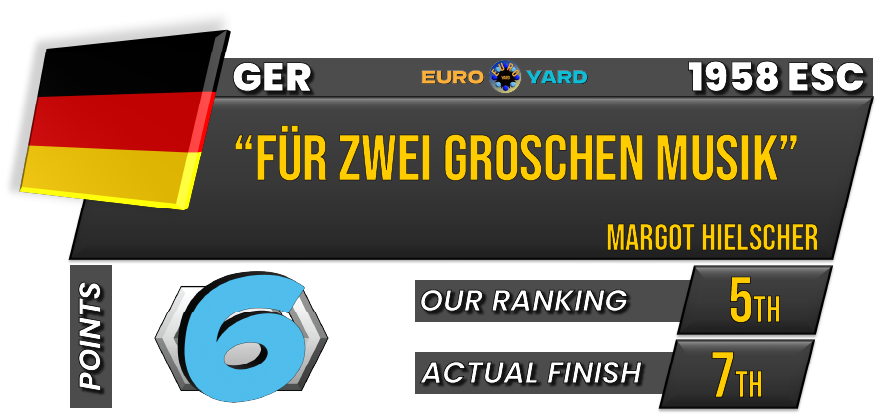
In fifth place, getting six points for Germany, was returnee Margot Hielscher and her song Für zwei Groschen Musik. Hielscher was one of the pioneers of staging at the Eurovision Song Contest, and this year, she came out in costume. Denmark did that in 1957, but this marked back-to-back years in which she introduced a staging element to her performances.
This song is nothing if not interesting. Yes, the vocals probably could have been better, but at least this song tells you a story. We have here a Eurovision song that name-checks both Dixieland and Verdi. It may not have been the best number of the night, but Miss Jukebox delivered here.
4th Place
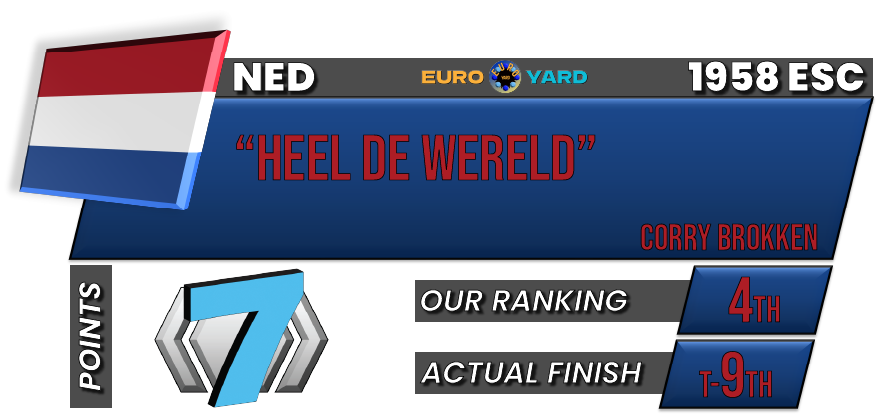
Coming in fourth was former contest winner Corry Brokken and her song Heel de wereld.
Though we have it in fourth position, and while we noted she tried to go for the bigger vocals this time, this was probably the weakest of her three songs. We still stan Corry Brokken here on Euro Yard, but it’s true. In fact, this one could have been a few spots lower, but it was a tight cluster of songs in the middle.
Maybe a little basic of a song, but she sang as well as she could have in my opinion. Fourth place might be a little generous here, but anything above that would have been a real reach.
3rd Place – Bronze Medal
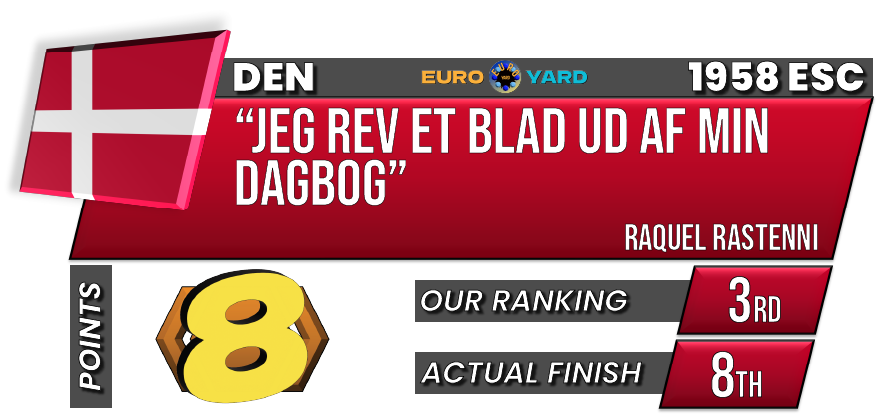
In third place, a bit of a surprise to us, was Jeg rev et blad ud af min dagbog by Raquel Rastenni. This translates into English as “I tore a page out of my diary.” She edged out a few songs behind her by a narrow margin on the scorecard.
In earlier ratings of the song, it was not very high: maybe fifth, maybe sixth. This time, with our new scoring rubric, closer attention was paid to the lyrics of the song as well as its originality. In a year where several songs almost put me to sleep, this song was actually pretty bad-ass, if I do say so myself. It starts with her ripping the page out of her diary, crumpling it, and then singing her frustrations. It almost reads like an antiquated version of a Taylor Swift song. Aside from that, she got above-average marks for vocals, like most other contenders this year.
Though I understand why it was not ranked very high (because I too had them lower in the past), this deserved far better than eighth place. Rastenni understood the assignment and did well.
2nd Place – Silver Medal
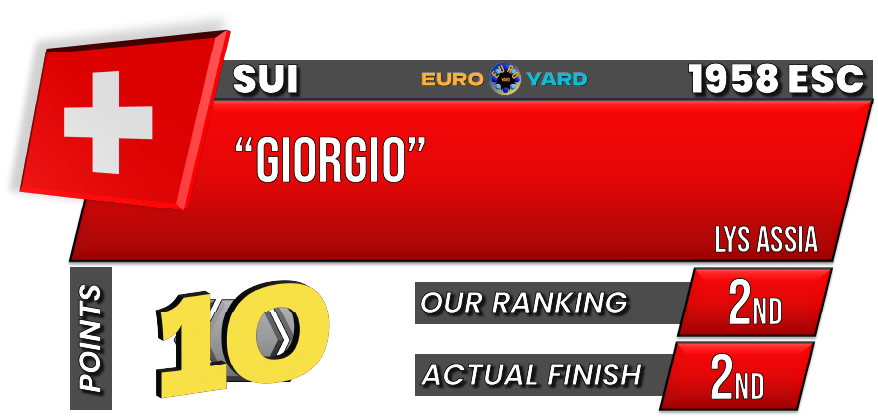
In second place is a former winner, Lys Assia, with her fourth and final Eurovision song, Giorgio.
It took some time for me to warm up to this song. After all, it is a bit obnoxious with how she keeps saying “Gior-GIOOOOOO,” but I suspect that might be something people like about it. One thing is clear: this song was the opposite of boring. It was quite inventive and original for its time, at least in the context of the Eurovision Song Contest. Assia showed a different side with this number, which was upbeat and light, in contrast to her slower and more methodical ballads of the past. Even Das alte Karussell (1956) was at a slower pace and cadence, despite being a sweet and light song.
Coming in second place, she very nearly won the contest a second time in 1958. Assia was just three points behind Claveau in the final tally.
Sadly, Assia’s attempt at a Eurovision comeback over 50 years later did not succeed. It would have been momentous to see her on the stage again, but alas, it was not to be.
1st Place – Gold Medal
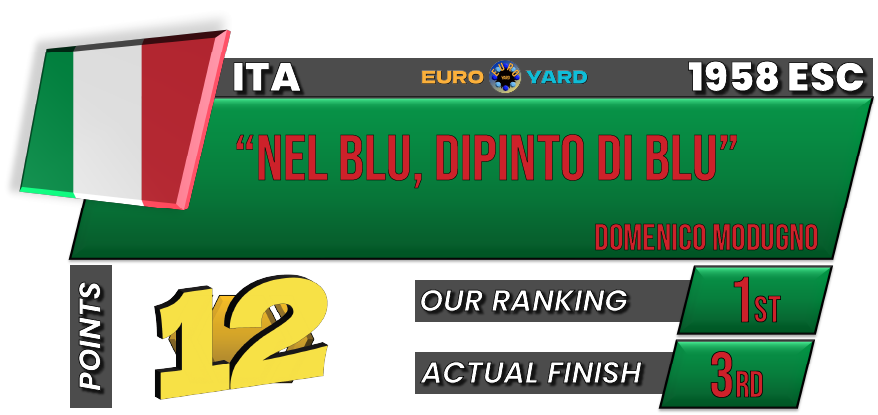
In our top spot – by a wide margin – was Italy’s Nel blu, dipinto di blu by Domenico Modugno. The literal translation is “in the blue, painted blue,” but it is a reference to the sky. Also known as “Volare” because of its chorus, this website has already commented on what a grave injustice was done to this song. The live performance was wonderful; no notes.
Domenico’s song went on to become the first Grammy winner for Record of the Year and Song of the Year, a true international hit that far transcended its performance in Hilversum. The song beat out the likes of Frank Sinatra and Perry Como to win, putting it in esteemed company. It was Eurovision’s first smash despite not winning the contest, and this is one of the most iconic songs of its generation. I knew this song long before I knew it came from Eurovision, and it has stood the test of time. I bet the juries regretted this one, and if they did not, they should have.
It could be that this song was just ahead of its time, or the juries stuck to a particular formula: the early winners of this contest (beyond 1958 and into the 1960s) were mostly cute, harmless, and nice but not too over-the-top. In my earlier viewings, as I scored the performances and then watched the results, I used to joke that the more boring a song was, the more the juries back then would like it. The Eurovision Song Contest was not ready for a big, bold song like Domenico offered, but the world was, and to many, he was the true winner in 1958.
Euro Yard All-Time Scoreboard Through Eurovision Song Contest 1958
Clicking the image will enlarge it.
Next Up
We head to Cannes, France for Eurovision 1959.



